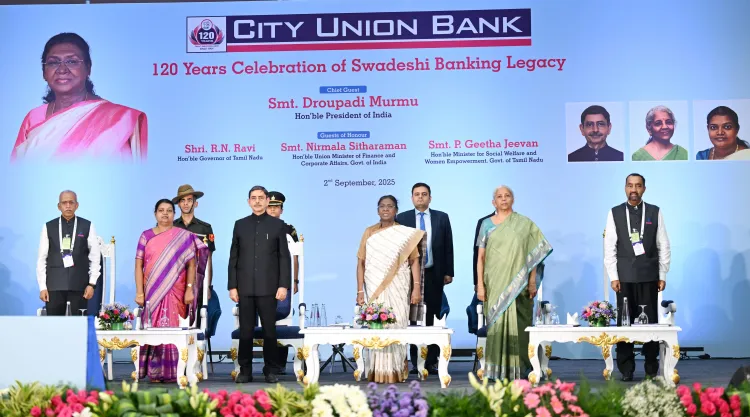How Can President Murmu Encourage Banks to Enhance Financial Inclusion?

Synopsis
Key Takeaways
- Financial inclusion is a key pillar of national development.
- Banks must ensure access to affordable financial services for all.
- Innovative solutions like mobile banking are vital for underserved communities.
- Empowering farmers and rural economies should be a banking priority.
- Collaboration among banks, fintech, and stakeholders is essential for success.
Chennai, Sep 2 (NationPress) On Tuesday, President Droupadi Murmu called upon banks to contribute towards achieving the national goal of full financial inclusion, which she identified as a vital component of the nation’s development.
During the 120th foundation day celebrations of City Union Bank in Chennai, she emphasized the integral role of banks in fostering inclusive and sustainable growth, urging them to ensure that every citizen has access to affordable financial services.
The President reiterated that financial inclusion is a fundamental pillar of the nation’s progress, which necessitates that all individuals can access economical financial services. She expressed her belief that institutions like City Union Bank are making significant strides in fulfilling this national objective.
As one of the fastest-growing major economies globally, India’s banking sector is crucial to its economic narrative. The role of banks has evolved, transcending mere financial transactions; they now provide a comprehensive array of financial services, she noted.
In her address, President Murmu highlighted that a significant portion of India's population resides in rural and semi-urban areas, often lacking access to formal banking facilities. She commended City Union Bank for its impressive achievements in promoting financial inclusion.
She pointed out that banks and fintech firms are innovating with user-friendly mobile applications, microloans, and insurance products aimed at underprivileged communities. Initiatives like payment banks, digital wallets, and banking correspondents have successfully brought financial services to the doorsteps of remote villages. However, she acknowledged that challenges such as digital literacy, internet availability, and financial awareness still persist. With the cooperation of all stakeholders, enhanced technology and digital literacy can integrate more individuals into the banking system.
The President urged that prioritizing the empowerment of farmers and the rural economy should be a key focus for the banking sector. By providing timely and affordable credit, promoting financial literacy, and backing agri-tech innovations, banks can support sustainable and profitable agriculture. They also hold the potential to transform MSMEs into significant engines of growth.
"Our banks must also take initiatives to assist the underprivileged and marginalized groups. Special attention should be directed towards better integrating daily wage earners and migrant laborers into banking services,” stated the President.
As India’s digital and knowledge-driven economy continues to evolve, the significance of banks in digital transformation and entrepreneurship becomes even more pronounced. From supporting start-ups to developing smart cities, banks can play a pivotal role in shaping a developed India, she concluded.







